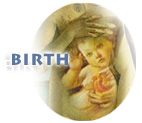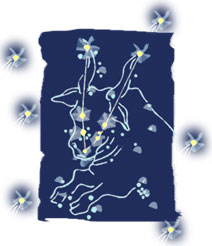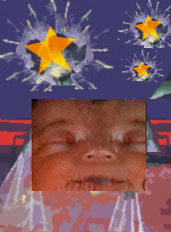|


Throughout
the ages, reports of a birth have often included the hope that the baby
had been born be-mazal tov, or be-siman tov, followed
by the traditional blessing that the child grow up to a life of Torah,
to marry, and perform good deeds. The announcement of a birth in a Jewish
family today is greeted customarily by family and friends with the same
Hebrew words, expressing hope that the infant was born with good luck
— under a good sign, siman, or star,
mazal. The Talmud uses mazal to mean "star"
or "constellation"; this word has come to mean "luck"
through the historical popularity of astrology.[1]
 Talmudic
sages discussed the effects of the celestial configuration on the night
of birth on a person later in life and expected similarities between
two people born under the same star. For example, one sage proposed
that a person born on Sunday would be distinguished; on Monday, wrathful;
on Tuesday, wealthy and sensual; on Wednesday, intelligent and enlightened;
on Thursday, benevolent; on Friday, pious. If born on the Sabbath, he
was destined to die on a Sabbath. Talmudic
sages discussed the effects of the celestial configuration on the night
of birth on a person later in life and expected similarities between
two people born under the same star. For example, one sage proposed
that a person born on Sunday would be distinguished; on Monday, wrathful;
on Tuesday, wealthy and sensual; on Wednesday, intelligent and enlightened;
on Thursday, benevolent; on Friday, pious. If born on the Sabbath, he
was destined to die on a Sabbath.
Astrologers
estimated that the influence of the ruling planet at the hour of birth
could be decisive in determining character, health, and longevity. For
example, someone born under the influence of Venus could become rich
and adulterous, whereas someone born under Jupiter was more likely to
become a righteous observer of commandments. The manner in which the
celestial configuration governed behavior remained controversial among
Jews for many centuries, however. Nevertheless, someone born under a
favorable constellation was considered lucky, whereas if the ruling
planet was likely to have unpleasant influences, a person would have
to use intelligence and judgment to overcome expected ill effects.[2]
Many
eminent medieval astrologers were Jews, who studied, among other things,
the influences of the heavenly constellation at a client's birth. Thus,
for example, in the twelfth century, Abraham ibn Ezra devoted a whole
chapter of his book, The Beginning of Wisdom, to explain how
the dominance of the planets and zodiac at the hour of birth affects
a person's future personality and health. He put this theory to practice,
and one horoscope that he cast (in 1160, in Narbonne) on the occasion
of the birth of a child has survived the ages.[3]
Several
other twelfth-century birth horoscopes calculated by Jewish astrologers
in Egypt for Jewish clients are preserved in the Cairo Geniza.
These horoscopes record the astrological coordinates of a birth in tabular
form, giving the positions of the planets and the corresponding zodiac
signs as well as a verbal account. Jewish astrologers noted the date
according to the Islamic, Christian, or Jewish calendar, all accepted
notation of the time.[4]
 Another
horoscope, calculated on the occasion of someone's birth, was bound
into the manuscript book of a Jewish astrologer from Bari, southern
Italy David ben Yacov Meir of the Kalonymos family. A page of extensive
calculations documented the night sky at 19 hours 02 minutes, on 28
March 1458.[5] Another
horoscope, calculated on the occasion of someone's birth, was bound
into the manuscript book of a Jewish astrologer from Bari, southern
Italy David ben Yacov Meir of the Kalonymos family. A page of extensive
calculations documented the night sky at 19 hours 02 minutes, on 28
March 1458.[5]
Some
medieval Jews rationalized that the stars affecting people's behavior
were themselves controlled by God's will. They taught that a person's
pious behavior could possibly influence God to modify the fate determined
for that person by the stars. The verses of a medieval Italian Jewish
poet reflected his belief that the stars at one's birth influence one's
fate; the autobiography of a seventeenth-century rabbi and astronomer
from Candia (Crete), and a mystical text, Sefer Razi'el, which
became popular in the eighteenth century, reveal the same belief.[6]
A popular
medieval legend, which has been retold in a ballad
sung at Jewish birth celebrations in the Balkans and which recounts
the birth of Abraham, reflects the age-old importance attributed to
celestial activity at the time of birth, as well as the medieval custom
whereby kings employed astrologers to help them make strategic decisions.
According to the legend, one evening King Nimrod summoned all his courtiers,
councilors, and astrologers to make merry with him. Late at night, as
they returned to their homes, they gazed up at the sky, and an enormous
comet coursed across the horizon from the east and swallowed four stars,
each in a different quarter of the heavens. The astrologers stood aghast
and whispered to one another: "Terah's son has just been born.
He will be a mighty Emperor. His descendants will multiply and inherit
the earth for all eternity, dethroning kings and possessing their lands:"
Nimrod ordered the baby to be put to death and relaxed only when he
was told that this had been done. The murdered infant was not in fact
Terah's child, however; his baby, who grew up to be Abraham, was well
hidden in a cave, where he was fed by the angel Gabriel.[7]
The
astronomical discoveries of Copernicus in the sixteenth century dealt
a severe blow to the practice of astrology. Even if some people take
astrology columns in newspapers seriously, the study of the stars on
the night of birth is usually far from the thoughts of a new father,
and the only remnant of these customs is the blessing of mazal tov.
 |
1.
Trachtenberg, J., Jewish Magic and Superstition
(New York: Atheneum, 1982): p. 311, n.1. [back]
2. TB Shabbat, 156a,6. Nedarim 32a. The Jews exiled
in Babylonia learned astrology from the Chaldeans of Southern Babylonia
and possibly also from the Zoroastrians, but many talmudic scholars
must have been familiar also with the astrology of the ancient Greeks
and even the influential writings of Ptolmey of Alexandria in the
second century. [back]
3. Levy, R. and F. Cantera, ed. Abraham Ibn Ezra:
The Beginning of Wisdom (Baltimore: Johns Hopkins University
Press, 1939) vol. 14, chapter 2, pp. 156ff. He leaned heavily on
Ptolmey's "Almagest." [back]
4. Fenton, P.B. "Les manuscripts astrologiqes
de la Gueniza du Caire," in Le monde Juif el l'astrologie,
edited by J. Halbrounn (Milan: Arche, 1985), appendix. . Isaacs,
H. Medical and Paramedical Manuscripts in the Cambridge Geniza
Collections (Cambridge: Cambridge University Press, 1994). Goiten,
S.D. A Mediterranean Society (Berkely: Univesrity of California,
1978), vol. 3, p. 233. [back]
5. Ms. Parma (2637), p. 336 f. 73. [back]
6. Abraham bar Hiyya (Spain, early 12th century),
and Eleazar of Worms (Germany, c. 1200), rationalized that the stars
affect people's behavior and are tehmselves controlled by God's
will. The Hebrew poet was Immannuel of Rome (c. 1261-c.1332); see
his poem in Carmi T, ed. and trans. The Penguin Book of Hebrew
Verse (London: Penguin, 1981), pp. 422-23. Barzily, I. Yosef
Schlomo Delmedigo (Leiden: E.J. Brill, 1974), p. 28. Delmedigo and
his friend, Rabbi Leon de Modena (1571-1648), believed that the
constellation at birth influenced one's personality; see also Cohen,
M.R., ed., constellation at birth influenced one's personality;
see also Cohen, M.R., ed. The Autobiography of a Seventeenth
Century Venetian Rabbi (Princeton, Princeton University Press,
1988), p. 100. Raziel ha-malakh (Israel: Meirav, undated). p. 68.
[back]
7. Graves, R. and R. Patai, Hebrew Myths
(New York: Doubleday, 1964), pp. 134ff. The story is from story
is from an early ninth-century midrash, Pirkei de Rabbi Eliezer,
chapter 26. The Ladino ballad is thought to come from a twelfth
century rendering of the legend: Attiad, M. "Romancot ve-shirei
am be-yahadut sepharadit" (Jerusalem: Ben Zvi Institute,
1961), p. 236-38. Weich-Shahak, S., "Shirim sepharadiim
yehudiim le-brit milah," Dohan 12 (1989): pp. 168-70.
More recently, it has become popular in a modern Hebrew version,
too, written and sung by Israeli Naomi Shemer. [back] |
 |
 From:
From: Michele Klein, A Time to be Born: Customs and Folklore
of Jewish Birth. © copyright 1998 by Michele Klein (Philadelphia:
Jewish Publication Society of America), pp. 201-202. Permission
of the author and Jewish Publication Society of America. From:
From: Michele Klein, A Time to be Born: Customs and Folklore
of Jewish Birth. © copyright 1998 by Michele Klein (Philadelphia:
Jewish Publication Society of America), pp. 201-202. Permission
of the author and Jewish Publication Society of America. |
 |
 Yossi
Zucker, Cuando
el rey Nimrod ("When Nimrod Went into the Fields"):
A Ladino folksong sung at Brit millah. With RealAudio recording. Yossi
Zucker, Cuando
el rey Nimrod ("When Nimrod Went into the Fields"):
A Ladino folksong sung at Brit millah. With RealAudio recording.
|
|



